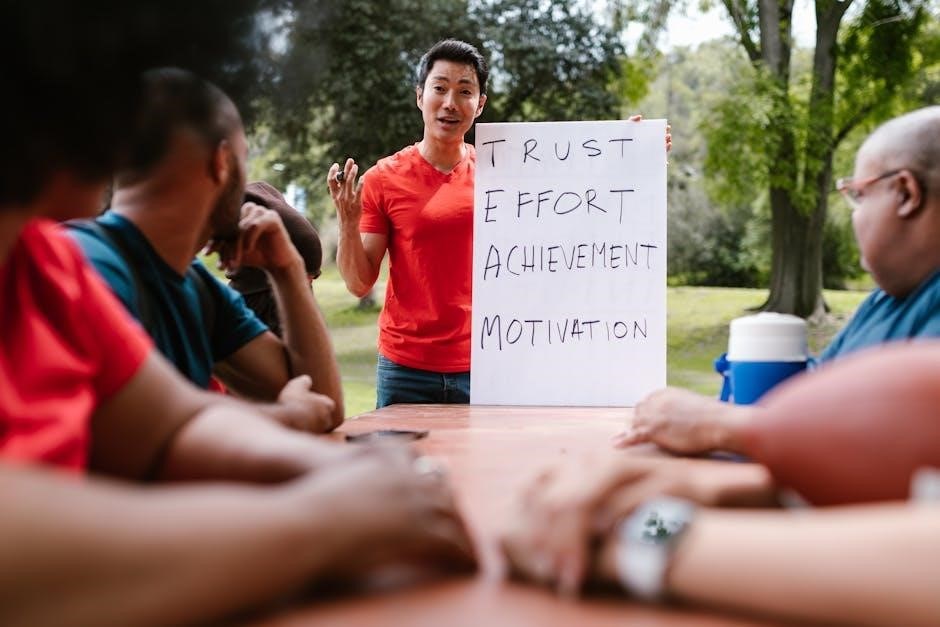Welcome to the Short and Happy Guide‚ your concise resource for finding joy in a fast-paced world. Designed for busy individuals‚ this guide offers practical strategies to enhance well-being‚ covering essential topics like time management‚ mindfulness‚ and relationships‚ all tailored for everyday success and fulfillment.
What is a Short and Happy Guide?
A Short and Happy Guide is a concise‚ practical resource designed to help individuals find joy and balance in their lives. It combines evidence-based strategies with simple‚ actionable tips to address key areas such as time management‚ mindfulness‚ and relationships. The guide is tailored for busy people seeking sustainable happiness without feeling overwhelmed. Its approach is rooted in real-world applications‚ making it accessible and effective for everyday life.
Why is Happiness Important in a Fast-Paced World?
Happiness is crucial in a fast-paced world as it helps individuals thrive amid constant demands. It fosters resilience‚ reducing stress and burnout while enhancing creativity and productivity. Happy people tend to build stronger relationships‚ make better decisions‚ and maintain a positive outlook‚ which are vital for personal and professional success. Prioritizing happiness ensures a balanced life‚ allowing individuals to navigate challenges with energy and optimism in an increasingly dynamic environment.
Time Management for Happiness
Effective time management is key to balancing productivity and joy‚ reducing stress‚ and creating space for activities that bring fulfillment and relaxation in a busy life.
How to Prioritize Tasks Effectively
Prioritizing tasks is essential for maximizing productivity and reducing stress. Start by listing all tasks and assessing their urgency and importance. Use the Eisenhower Matrix to categorize them into four quadrants: urgent and important‚ important but not urgent‚ urgent but not important‚ and neither urgent nor important. Focus on high-priority tasks first‚ delegate when possible‚ and break larger tasks into smaller‚ manageable steps. Avoid multitasking‚ as it reduces efficiency. Regularly review and adjust your priorities to stay aligned with your goals.
- Use a task list or planner to stay organized.
- Eliminate distractions during focused work periods.
- Learn to say no to non-essential tasks.
- Review progress daily to maintain momentum.
By prioritizing effectively‚ you can achieve more in less time and create space for activities that bring joy and fulfillment to your life.
Setting Realistic Goals for Daily Success
Setting realistic goals helps create a sense of accomplishment and momentum in your day. Start by identifying clear‚ specific objectives that align with your priorities. Use the SMART framework: goals should be Specific‚ Measurable‚ Achievable‚ Relevant‚ and Time-bound. Break larger goals into smaller‚ actionable steps to avoid overwhelm. Celebrate progress‚ no matter how small‚ to stay motivated. Consistency is key to building habits that lead to long-term success and happiness.
- Write down your goals to increase commitment.
- Review and adjust them regularly to stay on track.
- Focus on progress‚ not perfection.
Realistic goals empower you to make steady progress and find joy in the process.
Mindfulness and Gratitude Practices
Mindfulness and gratitude are powerful tools for fostering happiness and calmness in daily life. By staying present and appreciating small joys‚ you can cultivate resilience and positivity effortlessly.
Simple Exercises for Daily Mindfulness
Start with deep breathing: inhale for 4 seconds‚ hold for 4‚ exhale for 6. Practice mindful walking‚ focusing on each step. Use a gratitude journal to note daily positives. Try body scans or mindful eating to stay present. These exercises‚ even in moments‚ can reduce stress and boost joy‚ helping you stay grounded in a busy world. Consistency is key to making mindfulness a natural part of your routine.
The Power of Gratitude in Everyday Life
Cultivating gratitude transforms your mindset‚ fostering positivity and well-being. Keep a gratitude journal to document daily positives‚ no matter how small. Express thanks to others‚ whether verbally or through kind actions. This practice strengthens relationships and shifts focus to life’s good things. Regular gratitude practice can reduce stress‚ improve mental health‚ and create a more joyful outlook. Consistency is key to making gratitude a lasting‚ life-enhancing habit.

Physical Activity for Joy
Physical activity boosts mood and energy‚ fostering happiness. Engage in exercises like walking‚ dancing‚ or yoga to release endorphins and enhance mental well-being. Movement is key to joy.
Quick Workouts to Boost Mood
Incorporate short‚ high-energy workouts to elevate your mood. Try 10-minute HIIT sessions‚ bodyweight exercises like push-ups and squats‚ or brisk walking. Even dancing to your favorite playlist or a quick yoga flow can release endorphins and refresh your mind. These activities are perfect for busy days‚ offering a mood boost in minimal time. Consistency is key to maintaining emotional well-being and energy levels. Make movement a joyful part of your daily routine for lasting happiness.
How Movement Impacts Mental Health
Physical activity profoundly benefits mental well-being by enhancing mood‚ reducing stress‚ and combating anxiety. Exercise releases endorphins‚ natural mood elevators‚ while improving cognitive function and self-esteem. Regular movement fosters resilience against life’s challenges and promotes better sleep quality. Even short‚ enjoyable exercises can create a sense of accomplishment and joy‚ contributing to overall mental health. By incorporating movement into your routine‚ you invest in a happier‚ healthier mind and body.
Simplifying Your Life
Simplifying your life involves decluttering your space and mind‚ setting boundaries‚ and prioritizing what truly matters. This creates clarity‚ reduces stress‚ and fosters a sense of control and joy.
Decluttering Your Space for Clarity
Decluttering your space is a powerful step toward creating a peaceful and organized environment. By removing unnecessary items‚ you can reduce stress‚ improve focus‚ and gain a sense of control. Start by sorting belongings into categories‚ keeping only what brings value or joy. Donate‚ recycle‚ or discard items that no longer serve a purpose. This process not only clears physical space but also mental clutter‚ allowing you to prioritize what truly matters and live more intentionally.
Setting Boundaries to Reduce Stress
Setting boundaries is essential for protecting your time‚ energy‚ and mental well-being. Learn to say “no” without guilt‚ prioritize your needs‚ and communicate assertively. Healthy boundaries help reduce stress by limiting overcommitment and fostering respect in relationships. By clearly defining what you are and aren’t willing to do‚ you create space for what truly matters‚ leading to a more balanced and fulfilling life while maintaining harmony in both personal and professional spheres.

Building Strong Relationships
Fostering meaningful connections enriches life. Strong relationships are built on trust‚ communication‚ and shared joy. Prioritizing loved ones and nurturing friendships creates a supportive network‚ enhancing overall happiness and resilience daily.
Communicating Effectively with Loved Ones
Effective communication is key to nurturing relationships. By actively listening‚ expressing emotions clearly‚ and understanding each other’s needs‚ you can build trust and resolve conflicts. Regular check-ins foster empathy‚ ensuring everyone feels heard and valued. Using positive language and showing genuine interest strengthens bonds‚ creating a supportive environment that encourages open dialogue and deepens connections‚ leading to lasting happiness and mutual understanding in your relationships.
Fostering Friendships That Bring Joy
Nurturing friendships enriches life with laughter and support. Prioritize shared activities‚ whether hobbies or casual meetups‚ to strengthen bonds. Practice active listening and show genuine interest in others’ lives. Celebrate milestones and offer encouragement‚ fostering trust and connection. Surround yourself with positive‚ like-minded individuals who inspire joy and growth. Regular communication and shared experiences create lasting friendships‚ providing a supportive network that enhances overall happiness and well-being in daily life.

Nutrition for Happiness
Nutrition plays a vital role in mental well-being by fueling the brain and body with essential nutrients. A balanced diet rich in vitamins‚ minerals‚ and antioxidants supports mood and energy‚ promoting overall happiness and health.
The Role of Diet in Mental Well-being
A balanced diet plays a crucial role in mental health by providing essential nutrients that support brain function and mood regulation. Foods rich in vitamins‚ minerals‚ and antioxidants‚ such as whole grains‚ fruits‚ vegetables‚ and lean proteins‚ help maintain emotional stability and energy levels. A healthy diet can reduce the risk of mental health disorders and improve overall well-being‚ making it a cornerstone of a happy and fulfilling life.
Quick‚ Nutritious Meal Ideas
Quick‚ nutritious meals are essential for maintaining energy and happiness. Incorporate salads with fresh vegetables‚ whole grain wraps with lean proteins‚ and one-pot stir-fries with colorful veggies. Smoothies with fruits and nuts provide a fast boost‚ while omelettes with herbs and eggs offer a satisfying start. These meals are packed with vitamins and antioxidants‚ supporting mental clarity and overall well-being.

Sleep and Relaxation
Sleep and relaxation are vital for mental and physical rejuvenation. Prioritizing quality rest helps maintain energy levels‚ supports emotional well-being‚ and fosters a happier‚ more balanced lifestyle.
Creating a Restful Bedtime Routine
A restful bedtime routine starts with consistency. Set a regular sleep schedule and create a calming environment‚ such as dimming lights or using soothing music. Limit screen time before bed‚ as blue light can disrupt sleep. Engage in relaxing activities like reading or meditation to unwind. A warm bath or herbal tea can also promote relaxation. Reflect on your day’s gratitude before sleeping to foster a positive mindset. These small steps help improve sleep quality and overall happiness.
The Importance of Quality Sleep
Quality sleep is vital for both mental and physical well-being. It restores energy‚ enhances cognitive function‚ and supports emotional stability. During sleep‚ the brain processes experiences‚ strengthening memory and creativity. Lack of sleep can lead to irritability‚ poor focus‚ and weakened immunity. Prioritizing sleep ensures better decision-making‚ improved mood‚ and increased productivity. By making sleep a priority‚ you invest in a happier‚ healthier‚ and more balanced life‚ fostering long-term well-being and daily joy.
Cultivating a Positive Mindset
Cultivating a positive mindset is key to long-term happiness. It involves embracing optimism‚ practicing gratitude‚ and reframing challenges as opportunities for growth. A positive mindset enhances resilience and fosters joy in everyday life‚ helping you navigate life’s ups and downs with confidence and clarity.
Practicing Positive Affirmations
Positive affirmations are powerful tools for reshaping your mindset. By repeating uplifting statements‚ you can rewire your brain to focus on positivity and build confidence. Start your day with affirmations like‚ “I am capable and deserving of success‚” or “I embrace challenges with courage.” Consistency is key—practice them daily‚ even in front of a mirror‚ to reinforce self-belief. Over time‚ this practice fosters resilience and helps you approach life with a more optimistic outlook‚ enhancing overall happiness and well-being.
Embracing Failure as a Learning Tool
Failure is not a setback but a stepping stone to growth. Every misstep teaches valuable lessons‚ helping you refine your approach and build resilience. Recognize that success often follows repeated attempts. Instead of fearing failure‚ view it as an opportunity to learn and improve. Reflect on what went wrong‚ adjust your strategy‚ and move forward with confidence. This mindset fosters personal development and helps you navigate challenges with a positive outlook‚ turning obstacles into pathways for success.
Putting It All Together for a Happy Life
Combining time management‚ mindfulness‚ and positive relationships creates a balanced life. By prioritizing tasks and setting realistic goals‚ you can achieve daily success. Mindfulness practices‚ such as gratitude journaling and simple exercises‚ foster mental clarity and joy. Incorporating physical activity and nutritious meals enhances both physical and mental well-being. Finally‚ restful sleep and a positive mindset are crucial for sustaining happiness. Consistency is key to making these habits a lasting part of your routine‚ ensuring a happy and fulfilling life.
Maintaining Consistency in Your Happiness Journey
Consistency is the cornerstone of a happy life. By incorporating small‚ manageable steps into your daily routine‚ you can build lasting habits that promote well-being. Tracking your progress and celebrating milestones keeps you motivated. Flexibility is key—life’s unpredictability means adjustments are inevitable. Focus on progress‚ not perfection‚ and commit to continuous growth. Over time‚ these consistent efforts will lead to meaningful‚ lasting change‚ ensuring your happiness journey remains on track and fulfilling.
